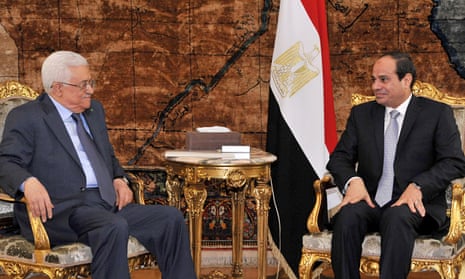Last week a convoy carrying medical supplies to Gaza from Egypt was turned back by Egyptian soldiers over 100km from the border. The convoy’s organisers knew they risked being stopped – but that was part of the point. “It was expected,” said Salma Said on her return home. “They do not want Egyptians to show support for Palestinians. They want to make sure that this siege and this isolation continues.”
During this latest Gazan war, the conflict has been predominantly portrayed as one between Israel and Hamas. But a third party has exacerbated the tensions in Israel’s favour: Egypt. A traditional broker of Israeli-Palestinian relations, Egypt is usually assumed to act with Gaza’s best interests at heart – and has done its best to maintain that perception in recent weeks. It has condemned Gazan deaths, called for a ceasefire, and allowed a few critically injured Gazans to be treated in Egyptian hospitals. Since Said’s blocked convoy, Egyptian officials have also finally allowed other medics and medical supplies to cross the border.
But other Egyptian actions – both over the past year, and in recent days – have led to accusations that Egypt is indifferent to Gazan suffering – and that its interests are aligned with Israel’s. Since last July Egypt has bolstered Israel’s blockade on Gaza by destroying over 1,600 tunnels that smugglers once used to bring crucial goods (and weapons) into the territory. The end of the tunnel trade, which Egypt had tolerated for years, crippled Gaza economically, since the simultaneous closure of Egypt’s formal border at Rafah meant Gazans had no other way of importing many supplies.
Hamas’s decision to carry on fighting in recent weeks despite catastrophic civilian losses owed as much to Egypt’s refusal to lift this blockade as it does to Israel’s. Egypt wanted Hamas to accept an immediate ceasefire without preconditions. But Hamas wanted Egypt to spell out how it might ease the siege before it did so.
Egypt’s leaders are loth to help Hamas because the group is an offshoot and ally of Egypt’s Muslim Brotherhood – whose scion, Mohamed Morsi, was ousted from office last July. To shore up its power, Egypt’s new regime, headed by the former army chief Abdel Fatah al-Sisi, has since waged a brutal crackdown on the Brotherhood inside Egypt. The squeeze on Hamas is part of the attempt to starve the Brotherhood of any remaining support.
To this end, Egypt has banned Hamas from operating inside Egypt, accused the group of aiding Egyptian terrorists, accused it of espionage, and tried many of its members in absentia. As Egypt’s counter-revolution gathered steam, Hamas was even blamed for a jailbreak during the 2011 Egyptian uprising.
Egypt’s pliant media have provided rhetorical backing to the government’s war on the Muslim Brotherhood and Hamas – and parts are doing something similar with Gaza. The country’s media are usually sympathetic to Gazans, but this time several columnists and presenters have appeared far more hostile. Some journalists have even denied any distinction between Gaza and Hamas. As Israel began its ground invasion earlier this month, Adel Naaman, a columnist for al-Watan, a private Egyptian newspaper, wrote: “I’m sorry people of Gaza: I’m not going to sympathise with you until you get rid of Hamas’s gang.”
The public’s attitudes are harder to gauge. Returning from the blocked aid convoy to Gaza, Salma Said said her colleagues’ work had revealed huge sympathy for Gazans among ordinary Egyptians. “The television makes it seem like no one in Egypt wants to help Gaza – but we are trying to show that’s wrong,” said Said. “We’ve received aid from Egyptians everywhere, north, south, east and west.”
Three weeks into the conflict, there are signs that Egypt’s official stance may be softening too – but for political reasons rather than wholly humanitarian ones. Rival countries – Qatar and Turkey – are also angling to broker a ceasefire, and the fear that Egypt may lose its traditional mediation role may finally spark its leaders into easing their stance.

